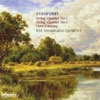Stanford String Quartets Nos 1 & 2
Neglected repertoire treated to superb playing and classy production-values
View record and artist detailsRecord and Artist Details
Composer or Director: Charles Villiers Stanford
Genre:
Chamber
Label: Hyperion
Magazine Review Date: 5/2005
Media Format: CD or Download
Media Runtime: 68
Mastering:
Stereo
DDD
Catalogue Number: CDA67434

Tracks:
| Composition | Artist Credit |
|---|---|
| Fantasy for Horn Quintet |
Charles Villiers Stanford, Composer
Charles Villiers Stanford, Composer Stephen Stirling, Horn Vanbrugh Qt |
| String Quartet No 1 |
Charles Villiers Stanford, Composer
Charles Villiers Stanford, Composer Vanbrugh Qt |
| String Quartet No 2 |
Charles Villiers Stanford, Composer
Charles Villiers Stanford, Composer Vanbrugh Qt |
Author: Andrew Achenbach
Stanford wrote the first two of his eight string quartets within just six weeks during the late summer of 1891 – and a most rewarding pairing they make, too. Both works were succesfully premiered by the Cambridge University Musical Society Quartet, founded by Richard Gompertz (a pupil of Stanford’s long-standing mentor, the great violinist, Joseph Joachim).
Cast in four movements and impeccably laid out for the medium, the G major First Quartet launches with an impressively wrought Allegro assai, whose considerable intellectual and expressive resource is quarried to the full by the Vanbrughs. Elsewhere, both the Scherzo and finale smile as they should, while these fine players bring a rare eloquence to the deeply-felt slow movement. Superior craftsmanship is also a trademark of its A minor companion. The first movement’s ruminative main theme is developed further still in the Andante espressivo slow movement. In between comes a dashing Prestissimo scherzo (dispatched with almost nonchalant ease by the Vanbrughs), and the work concludes with an irresistible Allegro molto (whose cheeky initial idea brings with it more than a whiff of Hungarian paprika).
Far less is known about the A minor Fantasy for horn and string quartet, save its completion date of June 6, 1922. A companion piece to the Two Fantasy Pieces for clarinet quintet completed not long before, it shares that diptych’s formal integration (its four sections are interlinked) and technical flair. Stephen Stirling audibly relishes Stanford’s superbly judged horn writing and generates a most satisfying rapport with the Vanbrughs.
As should by now be clear, these exemplary first recordings make the best possible case for all this rare material; sound and balance are first-class, too. A strongly recommendable issue, in sum, extensively annotated by Jeremy Dibble. Can we expect further instalments?
Cast in four movements and impeccably laid out for the medium, the G major First Quartet launches with an impressively wrought Allegro assai, whose considerable intellectual and expressive resource is quarried to the full by the Vanbrughs. Elsewhere, both the Scherzo and finale smile as they should, while these fine players bring a rare eloquence to the deeply-felt slow movement. Superior craftsmanship is also a trademark of its A minor companion. The first movement’s ruminative main theme is developed further still in the Andante espressivo slow movement. In between comes a dashing Prestissimo scherzo (dispatched with almost nonchalant ease by the Vanbrughs), and the work concludes with an irresistible Allegro molto (whose cheeky initial idea brings with it more than a whiff of Hungarian paprika).
Far less is known about the A minor Fantasy for horn and string quartet, save its completion date of June 6, 1922. A companion piece to the Two Fantasy Pieces for clarinet quintet completed not long before, it shares that diptych’s formal integration (its four sections are interlinked) and technical flair. Stephen Stirling audibly relishes Stanford’s superbly judged horn writing and generates a most satisfying rapport with the Vanbrughs.
As should by now be clear, these exemplary first recordings make the best possible case for all this rare material; sound and balance are first-class, too. A strongly recommendable issue, in sum, extensively annotated by Jeremy Dibble. Can we expect further instalments?
Discover the world's largest classical music catalogue with Presto Music.

Gramophone Digital Club
- Digital Edition
- Digital Archive
- Reviews Database
- Full website access
From £8.75 / month
Subscribe
Gramophone Full Club
- Print Edition
- Digital Edition
- Digital Archive
- Reviews Database
- Full website access
From £11.00 / month
Subscribe
If you are a library, university or other organisation that would be interested in an institutional subscription to Gramophone please click here for further information.




